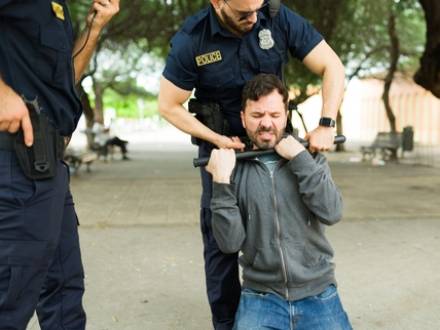When Does Resisting Arrest Become a Felony in Texas?
 Being accused of resisting arrest is a serious matter in Texas, and in some cases, the charge can be elevated from a misdemeanor to a felony. Knowing what makes that happen is critical if you or a loved one is facing these accusations. A felony charge means higher fines, longer prison sentences, and lasting consequences. If you are dealing with this situation, speak with a Hays County, TX criminal defense attorney who understands law enforcement procedures and can build a strong defense.
Being accused of resisting arrest is a serious matter in Texas, and in some cases, the charge can be elevated from a misdemeanor to a felony. Knowing what makes that happen is critical if you or a loved one is facing these accusations. A felony charge means higher fines, longer prison sentences, and lasting consequences. If you are dealing with this situation, speak with a Hays County, TX criminal defense attorney who understands law enforcement procedures and can build a strong defense.
What Does Texas Law Consider Resisting Arrest?
Texas Penal Code §38.03 makes it a crime to intentionally prevent or obstruct an identifiable peace officer from searching, arresting, or transporting you into custody. Despite how it may sound, "resisting" does not need to be violent or aggressive on your part. If you so much as pull away, stiffen your arms, or otherwise refuse to comply with physical attempts to detain you, you could face charges for resisting arrest.
When Is Resisting Arrest a Misdemeanor in Texas?
Resisting arrest is typically classified as a Class A misdemeanor. This is the default charge when there are no aggravating factors. In Texas, the penalties for a Class A misdemeanor include up to one year in county jail and a fine of up to $4,000. Even at the misdemeanor level, the charge can affect your employment opportunities, professional licenses, and other aspects of your life.
What Turns Resisting Arrest into a Felony in Texas?
The key factor that elevates resisting arrest to a felony in Texas is the use of a deadly weapon. Under Texas Penal Code §38.03(d), if you use a deadly weapon while resisting arrest, the offense becomes a third-degree felony.
In Texas, a deadly weapon can include:
-
Firearms, whether loaded or unloaded
-
Knives with blades longer than 5.5 inches
-
Clubs, brass knuckles, or other dangerous instruments
-
Any object used or intended to be used in a way that is capable of causing serious injury or death
A third-degree felony carries penalties of two to 10 years in prison and a fine of up to $10,000.
Can You Be Charged with Resisting Arrest Even if the Arrest Was Wrong?
One aspect of Texas law about resisting arrest that people find most surprising and challenging is that you can be charged even if the arrest itself was unlawful. The law specifically states that even if the arrest or search was unlawful, that is not a valid defense as long as the arresting officer was acting in their official capacity. You are not legally protected if you fight back physically when you are arrested, even if you believe your rights are being violated.
Your defense will instead focus on challenging whether your actions met the legal definition of "resisting," questioning the evidence, or showing that law enforcement’s account is unreliable.
Contact a Decatur, TX Criminal Defense Lawyer
If you are accused of resisting arrest, your future is at risk, whether you face a misdemeanor or a felony charge. You need an attorney who knows Texas law and understands law enforcement from the inside. At Godwin Law Firm, PLLC, our Hays County, TX criminal defense attorney is also a former traffic and highway patrol trooper and veteran who can identify improper arrest techniques, exaggerated use-of-force claims, or body camera footage that contradicts the official report. Call 940-255-0000 to schedule a free consultation.








